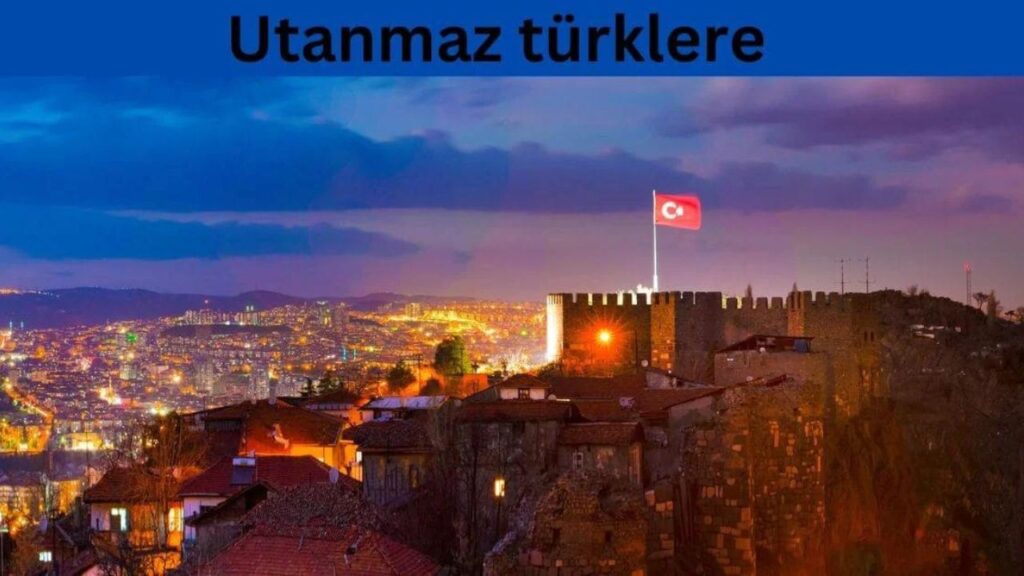Language and culture are inextricably intertwined, with certain phrases and expressions reflecting deeper societal values, tensions, and narratives. One such phrase that has stirred considerable discourse within Turkey is “Utanmaz Türklere.” This expression, which can be translated as “Shameless Turks,” carries a provocative connotation and has sparked debates about identity, societal behavior, and cultural norms in Turkish society. Understanding the impact of “Utanmaz Türklere” requires a look at its origins, usage, and the complex ways it has influenced both individual and collective attitudes in Turkey.
Understanding “Utanmaz Türklere”
What Does “Utanmaz Türklere” Mean?
“Utanmaz Türklere” is a phrase that combines “utanmaz,” meaning “shameless,” with “Türklere,” which translates to “to Turks.” The expression is often used in a critical or derogatory context to describe behavior perceived as morally or socially inappropriate according to certain standards. It is a term that carries negative connotations, often used to chastise or express disapproval towards certain actions or attitudes considered to lack modesty, honor, or propriety.
Origins of the Phrase
The origins of “Utanmaz Türklere” are not entirely clear, but it is rooted in the historical and cultural tensions that have shaped Turkish society over time. It likely emerged from a blend of social, political, and cultural dynamics that have prompted discussions about national identity, modernization, and the perceived erosion of traditional values.
- Historical Context: The phrase may have historical roots linked to periods of social upheaval or conflict, where traditional values were challenged by new ideologies or external influences.
- Cultural Dynamics: It reflects a broader cultural debate around morality, honor, and national pride, often evoking strong reactions and emotions.
The Cultural Significance of “Utanmaz Türklere”
Reflecting Social Critique
“Utanmaz Türklere” is often used as a form of social critique. It can be directed at individuals, groups, or behaviors perceived to undermine social norms or cultural expectations.
Critique of Morality and Decency
The phrase is commonly employed in contexts where traditional values of modesty, honor, and respectability are seen as being violated. For instance, it might be used in reference to:
- Public Behavior: Actions or behavior in public spaces that are considered unbecoming or disrespectful.
- Political Discourse: Describing politicians or public figures perceived to be acting without integrity or moral consideration.
- Media and Entertainment: Criticizing media content or public figures that challenge conservative values or norms.
Also Read: Elevate Your Leadership With Pedrovazpaulo Executive Coaching
Fostering National Identity Debate
“Utanmaz Türklere” has also played a role in the ongoing debate around national identity in Turkey. The term can serve as a mirror reflecting how different segments of Turkish society view themselves and their values.
Divergent Views on Modernization
The phrase often comes up in discussions about modernization, Westernization, and cultural authenticity. It can signify resistance to Western influences or new social norms that are perceived as threatening to traditional Turkish values.
- Conservative Perspectives: For some, “Utanmaz Türklere” represents a rejection of Westernization or liberal values that conflict with their understanding of Turkish culture.
- Progressive Views: Others may interpret the phrase as a tool for critique against restrictive norms, using it ironically to challenge outdated or oppressive social expectations.
The Impact of “Utanmaz Türklere” on Turkish Society
Social and Political Discourse
“Utanmaz Türklere” has had a significant impact on social and political discourse in Turkey. Its use often reveals underlying tensions between different societal groups, ideologies, and generations.
Fueling Polarization
The phrase has been used to fuel polarization in Turkey, particularly between conservative and liberal segments of society. It has become a shorthand for expressing broader cultural conflicts, such as:
- Generational Divides: Older generations may use the term to criticize the perceived loss of traditional values among younger people.
- Urban-Rural Differences: Urban dwellers might use it to mock rural conservatism, while rural communities may see it as a defense against perceived moral decay in cities.
Tool for Political Rhetoric
Politicians and public figures have sometimes employed “Utanmaz Türklere” in their rhetoric to appeal to conservative voters or critique opponents perceived as morally compromised or culturally disconnected.
- Populist Appeals: The phrase can be used in populist discourse to evoke national pride and moral outrage against perceived threats to cultural identity.
- Public Shaming: It can serve as a tool for public shaming, targeting individuals or groups who are seen as not conforming to dominant social values.
Media Representation
The term has also influenced how media and entertainment portray cultural and social dynamics in Turkey.
Representation in Media
“Utanmaz Türklere” has appeared in various media forms, including news outlets, television shows, and social media platforms, often shaping narratives about social behavior, morality, and cultural values.
- Satire and Irony: Some media use the term satirically to critique conservative views or mock rigid social norms.
- Drama and Conflict: TV shows and films may use the phrase to highlight cultural tensions or depict moral dilemmas faced by characters.
Influence on Everyday Language and Behavior
“Utanmaz Türklere” has permeated everyday language, influencing how people express disapproval, moral judgments, or cultural critique.
Shaping Social Interactions
The phrase has become a common expression for voicing dissatisfaction with behaviors considered inappropriate, impacting how individuals communicate and interact.
- Common Usage: The term is often used in conversations, online comments, and social media posts, contributing to its ubiquity in everyday discourse.
- Cultural Sensitivity: As the phrase gains traction, it also raises awareness about cultural sensitivity and the impact of language on social cohesion.
The Controversy Surrounding “Utanmaz Türklere”
A Double-Edged Sword
While “Utanmaz Türklere” is a powerful expression of cultural critique, it is also a double-edged sword that can foster division and misunderstanding.
Promoting Stereotypes
The phrase has the potential to reinforce negative stereotypes about certain groups or behaviors, promoting an oversimplified view of complex social issues.
- Stigmatization: It can contribute to stigmatizing individuals or groups based on perceived cultural or moral failings.
- Cultural Backlash: Overuse or misuse of the term may lead to a cultural backlash, where those criticized embrace it as a badge of honor or use it to challenge conservative values.
Debate Over Freedom of Expression
The usage of “Utanmaz Türklere” also raises questions about freedom of expression and the boundaries of cultural critique.
- Censorship Concerns: Some argue that the term is used to silence dissenting voices or marginalize those who deviate from traditional norms.
- Empowerment through Language: Others believe that reclaiming or subverting such phrases can empower individuals to challenge oppressive social standards.
Moving Forward: A Reflective Approach
Towards a Constructive Dialogue
The impact of “Utanmaz Türklere” on Turkish society suggests a need for more nuanced conversations about culture, identity, and values.
- Encouraging Dialogue: Fostering open and respectful dialogue between different segments of society can help bridge gaps and build mutual understanding.
- Embracing Diversity: Recognizing the diversity within Turkish society and valuing different perspectives can lead to a more inclusive approach to cultural critique.
Reconsidering Language Use
Given the power of language to shape social attitudes, reconsidering the use of divisive terms like “Utanmaz Türklere” could be beneficial.
- Promoting Positive Language: Encouraging the use of language that fosters inclusivity and respect can help mitigate the negative impact of polarizing phrases.
- Understanding Context: A deeper understanding of the context in which such terms are used can lead to more empathetic communication.
Also Read: Stay Ahead In Sports With The iOS App eTrueSports
Conclusion
The phrase “Utanmaz Türklere” holds a unique place in Turkish society. Serving as both a tool for cultural critique and a reflection of the country’s ongoing debates about identity, modernization, and values. While it has the potential to foster division. It also offers an opportunity for meaningful dialogue and reflection on the complexities of cultural identity. Moving forward, a more nuanced understanding and respectful use of language can help bridge. Societal divides and promote a more inclusive approach to cultural discourse.
FAQs
What does “Utanmaz Türklere” mean?
“Utanmaz Türklere” translates to “Shameless Turks” and is used to criticize behaviors or actions. Perceived as lacking modesty, honor, or propriety.
How does “Utanmaz Türklere” impact Turkish society?
The phrase impacts Turkish society by influencing social and political discourse, shaping media representation. And affecting everyday language and behavior.
Why is “Utanmaz Türklere” considered controversial?
It is considered controversial because it can promote stereotypes, fuel cultural polarization. And raise concerns about freedom of expression and cultural critique.
Can “Utanmaz Türklere” have a positive impact?
While often used negatively, the phrase can also be a tool for challenging outdated social norms. And encouraging dialogue about cultural values.
How can society address the divisive use of “Utanmaz Türklere”?
Promoting open dialogue, encouraging the use of inclusive language. And understanding the context of its use can help address the divisive impact of the phrase.
Is “Utanmaz Türklere” commonly used in Turkish media?
Yes, it is frequently used in Turkish media, from news outlets to social media. Often shaping narratives around morality and cultural values.



